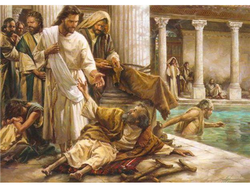
There were also two others, criminals, led with Him to be put to death. And when they had come to the place called Calvary, there they crucified Him, and the criminals, one on the right hand and the other on the left. Then Jesus said, "Father, forgive them, for they do not know what they do."
Part 2: “Father Forgive Them”: They Know Not What They Do”!
This first word, really the first of 7 last statements Jesus would make before He "gives up the ghost" is a loving request from Jesus praying to God the Father to grant forgiveness is given in behalf of a people who didn’t (according to Jesus) know what they were doing.
Luke in this passage described the crucifixion crowd as standing and beholding Jesus as He hung from the cross between 2 condemned criminals with an attitude of indifference along side with the Sanhedrin rulers, the Pharisees in particular, bellowing out verbal derision toward Jesus suffering the pain and agony on a cruel Roman cross. Immediately with this loving request, we come face to face with the Agape love of God, and the forgiveness only God himself can give. Jesus, as he makes this petition to the Father fulfills Isaiah 53:10-12 (NIV) as “ It was the Lord 's will to crush him and cause him to suffer, and though the Lord makes his life a guilt offering. He will see his offspring and prolong his days, and the will of the Lord will prosper in his hand. After the suffering of his soul, he will see the light of life and be satisfied. By his knowledge my righteous servant will justify many, and he will bear their iniquities”.
From the human perspective, the last thing you would have thought would come from a person’s mouth having gone through the vicious ordeal Jesus went through would be to ask God to forgive the very ones who treated them in the vile and inhumane way our Lord and Savior was treated after his arrest in the Garden of Gethsemane.
The Biblical record tells us he was made to carry his own cross after experiencing a severe beat down with many stripes from front to back, having a crown of thorns pushed down forcefully on his head, piercing his scalp and brow, and given a purple robe to wear. Yet this is the first thing Jesus said. He offers a prayer in behalf of those he said “knew no what they were doing. Jesus lets us know through Peter in Acts 3:17-18 what they mob was doing was done through ignorance: "Now, brothers, I know that you acted in ignorance, as did your leaders. But this is how God fulfilled what he had foretold through all the prophets, saying that his Christ would suffer. Paul said in 1 Corinthians 2:8 that, "had they known it, they would not have crucified the Lord of glory," Now ignorance does not excuse altogether a crime if the ignorance is "willful ignorance".
Scholars often have debated over the centuries as to who Jesus was referring to, whether he referred to the Romans, the Jews or both. I believe he was speaking of both for the following reasons:
First the obvious. The Romans in general were ignorant of the fact that Jesus was the Son of God. Yet in Matthew 27:54, a centurion is recorded as declaring: “Truly, this must have been the Son of God”. Is there a contradiction? Highly unlikely! There is nothing to suggest that this centurion had any historic knowledge of the Jews’ expectation of a Messiah, and in all likelihood, thus the "euologetic" words he used wasn't used in that sense.
What he did know was on that day upon Calvary's hill where the crucifixion took place, a lot of strange things happened, especially around the 6th hour when all of a sudden, the sky became dark. The phrase: “Son of God”, as the Romans used the term, meant to them the person in question was either “very eminent” or a “Divine person or seen as a hero. But even in this sense, this centurion gave Jesus more “credence” as to his identity than the Jews did who rejected him as Messiah and yet are the chosen people of God. Apparently, the centurion perceived that Jesus was divine based on his demeanor and the veracity of the crowd gathered against him.. John the Baptist echoed the way the Jews saw Jesus and ultimately treated him in John 1:11-13:
"He came to His own, and His own did not receive Him. But as many as received Him, to them He gave the right to become children of God, to those who believe in His name: who were born, not of blood, nor of the will of the flesh, nor of the will of man, but of God". NKJV
Second, it wasn't that the Romans hadn't heard the rumors the crowds circulated about Jesus. It was their duty to keep the peace of Rome, so they followed the crowds and monitored their movement. This means they heard of his teachings. They monitored his activities.They were aware of the murmuring among the Pharisees and the other religious leaders as Jesus became more popular with the citizens of each city and more in opposition with the teachings of the Pharisees.
Pilate proclaimed that Jerusalem was always the “hot bed” of potential insurrection, but at this point, there was a heavy tension in the air. Also, keep in mind the Jews couldn’t stand the Romans and longed to get rid of their rule over them. The Roman armies were well aware of how the Jews felt about them. And yet despite that, one Centurion could even testify that Jesus showed compassion toward him when he healed his servant, who was sick of the palsy and never set foot in his house when he did it. All it took was just the healing words spoken from Jesus. But in general, the Romans being who they were had a real ignorance of who Jesus really was. The soldiers were simply obeying the edict handed down by Pilate who sign the death warrant, and carried out by their superiors.
On the other hand, the Jews, God’s chosen people, could not make the same claim. They look for centuries for their Messiah. The prophets In the Old Testament declared His coming. God told Adam and Eve in the Garden of Eden before he kicked them out that He was coming. Isaiah, Jeremiah, Ezekiel and Daniel said He was coming. Hosea, Joel, Amos and Obadiah said He was coming. Jonah Micah, Nahum, Habakkuk and Zephaniah said He was coming. Haggai, Zachariah, even Malachi said the Messiah is coming. Here they were, the people who Isaiah told us had great expectation and walked in darkness, but now have seen a great light. The same people who John the Baptist loudly declared to “Repent, for the kingdom of Heaven is at hand”, telling them concerning Jesus: Behold, the Lamb of God who come to take away the sin of the world.
Now here they are, “by-standing” at the cross, watching in rejection, the very one who they were searching for, yet not realizing that their Messiah is hanging on the cross right before them. In their hearts, they had to know that Jesus was "innocent". Jesus had given them a multitude of miracles and clear teachings on the Scriptures that proved as Nicodemus said: that he was a man sent from God. They had conclusive evidence. All they had to do would is look at it and they would have realized that Jesus was their Messiah. They even asked among themselves: Could this be the Messiah we have been looking for? But, as it stood, as Jesus said, they didn’t know what they were doing.
If they had known., they would not have crucified him, as we cannot suppose that they would knowingly put to death their own Messiah, the hope of the nation, and him who had been so long promised to the fathers.
What can we learn from the love and passion expressed by Jesus when he made this prayer request to the Father?
1. If we truly love God with our all, and also love our neighbor as we love ourselves, then we quickly realize that we have obligation to pray for our enemies, no matter what they did to us and the lingering emotional harm it may have left us dealing with. We must pray that God would change their heart and the way they think because when we are harmed, they are as Jesus said also harming him.
2. When we pray, we should forgive them and pray that God also would forgive them.
3. We need to learn about the power and excellence of the Christian religion. There is no other known religion that "teaches" its followers to pray for the forgiveness of their enemies; or compels them to do so. In general, men of the world when wronged seek for "revenge. Christian learn to bear every reproach and persecution with patience, then prays that God would both pardon those who did them wrong, and save them from their sins.
4. Any sinner because of Jesus making intercession may be forgiven. God will hear a sinner’s prayer and will pardon the offense. Many who were converted after the death of Jesus Christ through the preaching of the Gospel by the Apostles.
Dr. William Edward Boddie


 RSS Feed
RSS Feed